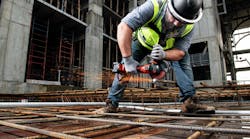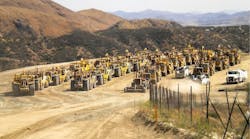Butler Manufacturing of Annville, Pa., and High Steel Structures Inc. of Lancaster, Pa., teamed up to fabricate steel framing used to build a new athletic center at West Point, a project that began in June 2006. The 92,000-square-foot Athletic Center is adjacent to Michie Stadium, the venerable football stadium at West Point.
Butler Manufacturing had the lead on designing the frames and called upon assistance from High Steel Structures, a bridge superstructure fabricator, as an efficient approach to making the larger components for the project. High Steel Structures has found that providing strategic assistance to building fabricators such as Butler is a logical application of their core competencies in the bridge-building industry.
History of the projectIn 2005, the United States Military Academy announced an initiative that would complete the Michie Stadium Athletic Complex begun in 2001. The key addition was the indoor athletic training facility.
Following a year-long process of design and construction planning, it was determined that a pre-engineered steel building system would be best suited to create the unique features planned for the new 92,400-square-foot building. This decision was made in large part due to the ability of such structures to span large areas, to offer shorter construction times than traditional methods and to provide greater overall lifecycle value.
Butler Manufacturing played a critical role in the process, designing the frames that were used for the building. The plans include an indoor training facility that is unlike the field houses or athletic facilities found on most college campuses. The building has unusually high (65 feet) ceilings to accommodate punting, kicking and return drills.
Other special features include padding on the interior walls to ensure a higher degree of safety, special lighting configurations to enhance the quality of videos shot during practices, a 40-yard sprint track for speed training, and FieldTurf artificial turf to provide a field surface that is more realistic and safer for the athletes.
In all, more than 825 tons of steel were used to construct the facility.
Butler Manufacturing is a leading manufacturer and provider of pre-engineered steel building systems. Because of the unique nature of this project, Butler decided to work with High Steel Structures to build the large steel frames. Hardy Construction, a Butler Builder based in Syracuse, N.Y., was involved in the project at an early stage as a member of the core design team. They also managed the entire process of setting the steel and installing the pre-engineered wall and roof products to complete the structure.
The project was funded by the largest single donation in the history of the federal Service Academies — a $15-million donation to West Point's Association of Graduates from Bill and Carol Foley. Foley graduated from the Military Academy in 1967 and was commissioned as an officer in the United States Air Force where he reached the rank of Captain. Foley is the chairman of the board and the CEO of Fidelity National Financial Corporation.
The facility will be named the Foley Athletic Center in recognition of Mr. Foley's donation, which is the largest single gift in the history of West Point. Construction was scheduled to be completed in January 2007. The FAC will help the Athletic Teams maximize their performance and attract better recruits; all ultimately adding to the viability of West Point and the country.
Founded in 1931 in Lancaster, Pa., High Steel Structures Inc. is one of the largest fabricators of structural steel in the United States, with more than 1 million tons of steel fabricated over the past 20 years. The company is part of The High Companies, whose 700-plus co-workers fabricate a wide range of complex bridge components and heavy building girders, and the company offers bridge steel erection, transportation and emergency bridge repair services.



